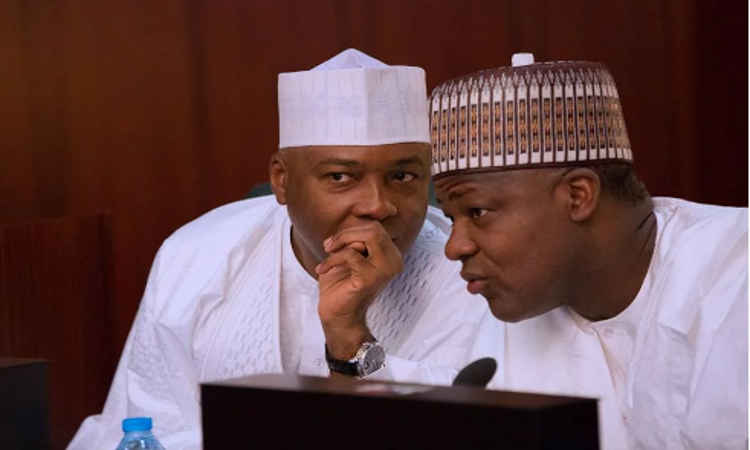Three prominent Nigerian leaders have called for adequate funding of the National Assembly.
President of the Senate, Dr. Bukola Saraki, speaker of the House of Representatives, Yakubu Dogara, and former speaker and Sokoto State governor, Aminu Tambuwal, who spoke at the convocation ceremony of the National Institute for Legislative and Democratic Studies, NILDS/University of Benin Post Graduate Programmes for the 2015/2016 and 2016/2017 academic sessions held at the National Assembly Monday, said lawmakers in the eight assembly, had committed themselves to improving the lives of Nigerians.
They also harped on adequate funding of both arms of legislature because of the important role they play in nation building.
The Senate President, who is the chairman of NILD Governing Council, said core legislative, oversight and representative functions of the legislature are to contribute to the quality of governance.
He said: ”There is no gainsaying the fact that the core legislative, oversight and representative functions of the legislature provide an essential contribution to the quality of our democracy and governance as a whole.
“In the eighth National Assembly, the legislature has played a greater role in policy formulation and has engaged more robustly with the Executive at the various stages of policy formulation. This stems from our conviction that the task of nation-building must be a collective one, and this sometimes requires sacrifices on the part of the individual.
“Many of the legislative measures we have pursued since 2015 have been targeted at driving productivity, easing access to finance, creating jobs and improving livelihoods. Legislative proposals in this area are focused on Micro, Small and Medium Enterprises, MSMEs, particularly in reducing regulatory burdens and easing access to capital, with the objective of having a large number of sustainable fast-growing small and mid-size businesses.
”We have also taken legislative action to tackle tax avoidance and evasion, to encourage compliance with tax obligations by all persons.
“We have shown commitment to the need to develop our education sector, with a special focus on improving the quality of primary and secondary education, which have suffered from lack of investment and infrastructural provision.
”Our vision is to see to the attainment of 100 per cent literacy rate for all Nigerian children aged 12 and below. The Senate has also amended the Universal Basic Education (UBE) Act to ensure that the 2 percent budgetary allocation to Universal Basic Education Commission by the Central Government is increased to three percent.”
He also listed the aspects of basic healthcare and human capital development as areas that had attracted the attention of the lawmakers, attributing the successes recorded by the legislators to the professional permanent staff and legislative aides.
Also noting that the National Assembly had helped save Nigeria from collapse, speaker of the House of Representatives, Yakubu Dogara, said to attain stable, strong and effective governance in Nigeria, the National Assembly must receive priority attention in terms of capacity building.
Arguing that the legislature was the true face of democracy, Dogara said it was preferable to build healthy and strong institutions as the legislature than strong personalities.
“It is our considered opinion that if there is any institution of government that should receive priority attention in terms of capacity building, it is the legislature. This is because the legislature is the true face of democracy.
”In our maturing democracy in this country, the legislature is the stabilising force as it has robust constitutional powers to check-mate the executive misuse and abuse of power which occasionally rears its head.
“Credit must be given to the Nigerian parliament, which has continued to make laws, perform its representative functions and make robust use of the power of oversight in order to preserve our hard-won democracy and achieve good governance.
“A key factor in moving from a nominal democracy to democracy that delivers development results for people is an effective legislature that holds the executive to account, especially in developing countries burdened by weak governance structures like Nigeria and lamented that whereas much work has been done on strengthening executive leadership, not much attention has been paid to systematically building the capacity of the legislature to effectively contribute to national development,” he said.
He said in the last two decades, the Nigerian legislature contributed to providing better governance in Nigeria by setting unprecedented record in the areas of lawmaking, which has translated to stimulating economic growth and prompting competition.
Dogara added: “What is expected of modern legislatures goes beyond the traditional role of representation, law-making and oversight. The legislature in Nigeria must serve a greater purpose within wider national democratisation processes.
”Over the last two decades, the National Assembly has transitioned from being the weaker institution to becoming a strong and capable agent of change.
”Our activism in the area of law-making is attested to by the unprecedented record we have set in the area of law-making.
”Some of these laws are specifically designed to stimulate economic growth and promote competition. We have also successfully intervened in crises situations to save the country from avoidable collapse,” he said.
Governor of Sokoto State and a former speaker of the House, Aminu Waziri Tambuwal, said there was an urgent need to properly fund the legislature.
He, however, noted that this might not be well received by the executive arm of government.
According to him, to get better legislation churned out, the National Assembly needs funds.

